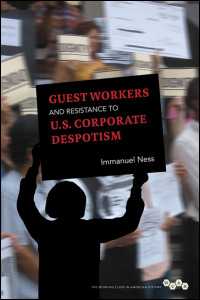 Immanuel Ness’s new book Guest Workers and Resistance to U.S. Corporate Despotism just landed on my desk. The official publication date is October 3, 2011, but we will begin shipping back orders over the next two weeks.
Immanuel Ness’s new book Guest Workers and Resistance to U.S. Corporate Despotism just landed on my desk. The official publication date is October 3, 2011, but we will begin shipping back orders over the next two weeks.
In Guest Workers, Ness, a professor of political science at Brooklyn College, City University of New York, exposes the corporate structures behind exploitative migrant labor programs.
From the introduction:
Much of the present debate on immigration policy revolves around the failure and unintended consequences of utterly inconsistent U.S. government policies to establish and regulate the flow of authorized and unauthorized migrants. Ineffectual regulatory policies have bifurcated migrant workers into two groups—undocumented laborers and guest workers. Focusing on guest workers rather than on undocumented laborers foreshadows the potential prospects and pitfalls of the program for foreign workers as well as U.S. nationals, and the potential influence of such a program on the broader labor movement and working class. This book shows that if government and corporate efforts to replace undocumented laborers with an established guest worker labor force succeed, conditions for all workers will significantly diminish.
Focusing on the United States as the world’s leading recipient of foreign workers, this book examines the intersection between labor, capital, and government policies in advancing corporate profits. As we have seen in past immigration bills, government programs are plagued with uncertainty and doubt. Can the federal government seriously address the status of more than twelve million undocumented migrants in the United States that most employers welcome in flagrant defiance of the 1986 Immigration Reform and Control Act (IRCA) law? Since 2000, the AFL-CIO and most major unions adopted a policy for repeal of Public Law 99-603 of IRCA, which sanctions “employers who knowingly hire undocumented workers” (USCIS 2010a). But if a new comprehensive bill is enacted repealing the most harmful provisions of existing law for undocumented immigrants, most proposals have called on a new guest worker law that will institutionally marginalize temporary workers. Furthermore, if the new legislation moves most undocumented workers into a guest worker program, many unions that have grown by organizing low-wage service workers conceivably could suffer significant loss in membership.
The U.S. government propaganda machine and the media greatly exaggerate and overstate foreigners’ conviction that they will improve their living standard by working in the United States. To be sure, laboring in the hub of the empire might provide help to some workers, but only in the unlikely event that economic conditions improve soon; most migrants expect to return to their home countries. Why must global capitalists push, pull, shove, or force migrant workers to travel to the United States just for economic sustenance? The evidence in this book is that most unauthorized migrants do not enthusiastically go to the United States. Unlike some guest workers, the decision to migrate without authorization across the U.S. border does not represent a significant advance in wages but an economic necessity. Migrants risk life and limb in exchange for a job with low pay, low status, and lack of voice. It is not the job that degrades the worker but, rather, the powerless and poor conditions under which they labor.
